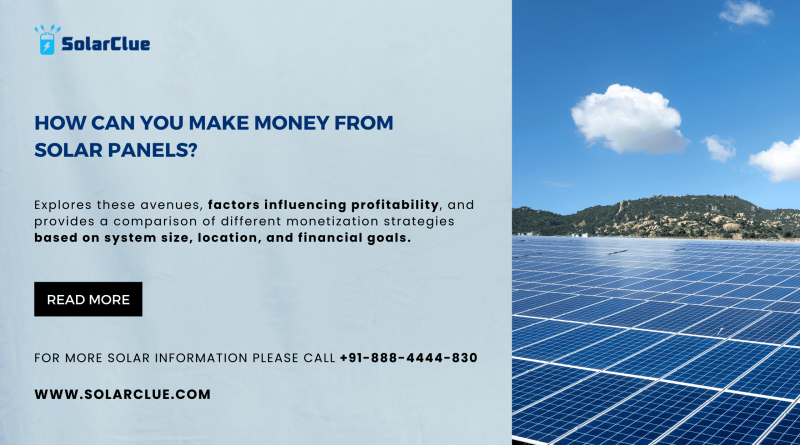How Can You Make Money From Solar Panels?
Solar energy is not only a sustainable and environmentally friendly power source but also a potentially profitable investment. There are various ways to monetize solar panel investments, ranging from net metering and selling excess electricity to solar leasing and power purchase agreements (PPAs). This blog explores these avenues, factors influencing profitability, and provides a comparison of different monetization strategies based on system size, location, and financial goals.
Table of Contents
- 1 Net Metering and Feed-In Tariffs
- 1.1 Selling Excess Electricity Back to the Grid
- 1.2 Solar Leasing and Power Purchase Agreements (PPAs)
- 1.3 Solar Renewable Energy Certificates (SRECs)
- 1.4 Solar Farms and Large-Scale Power Generation
- 1.5 Government Incentives and Subsidies for Solar Energy
- 1.6 Financial Analysis of Different Monetization Options
- 1.7 Risks and Challenges in Monetizing Solar Investments
- 1.8 The Future of Solar Energy Monetization and Emerging Trends
- 1.9 Conclusion
- 1.10 Comparison of Monetization Strategies
- 1.11 FAQs
Net Metering and Feed-In Tariffs
Net Metering
Net metering allows solar panel owners to send excess electricity back to the grid in exchange for credits on their utility bills. This system enables homeowners to offset their energy costs by using these credits when their panels are not producing enough power.
Feed-In Tariffs
Feed-in tariffs (FITs) are policies where utilities pay solar panel owners a fixed rate for the electricity they generate and feed into the grid. FITs can provide a stable and predictable income stream over the life of the solar panels.
Selling Excess Electricity Back to the Grid
When a solar panel system produces more electricity than needed, the excess can be sold back to the grid. This process involves:
1. Grid Connection: Ensuring the solar system is connected to the local electricity grid.
2. Utility Agreements: Setting up agreements with the utility company to sell excess power.
3. Monitoring: Keeping track of electricity production and usage to optimize income.
Solar Leasing and Power Purchase Agreements (PPAs)
Solar Leasing
This allows homeowners to lease solar panels from a third-party provider. The provider installs and maintains the panels, and the homeowner pays a fixed monthly lease payment. Benefits include lower upfront costs and maintenance handled by the provider.
Power Purchase Agreements (PPAs)
In a PPA, a third-party developer installs and maintains the solar panels on the homeowner’s property. The homeowner then purchases the generated electricity at a predetermined rate, usually lower than the local utility rate. This setup also involves little to no upfront costs and predictable energy prices.
Solar Renewable Energy Certificates (SRECs)
SRECs are tradable certificates that represent the environmental benefits of generating solar power. Solar panel owners earn one SREC for every megawatt-hour (MWh) of electricity their system produces. These certificates can be sold to utilities or other buyers looking to meet renewable energy requirements.
Solar Farms and Large-Scale Power Generation
Solar Farms
This will help to generate electricity for sale to utilities or other buyers. They require significant investment but can yield substantial returns. Key considerations include:
- Land Acquisition: Securing suitable land with high solar potential.
- Permitting and Regulations: Navigating local and national regulations.
- Financing: Securing funding for the initial investment and ongoing operations.
Government Incentives and Subsidies for Solar Energy
Government incentives and subsidies can significantly impact the profitability of solar investments. These may include:
- Tax Credits: Federal and state tax credits that reduce the initial cost of solar installation.
- Grants and Rebates: Financial assistance programs for solar projects.
- Loan Programs: Low-interest loans for financing solar installations.
Financial Analysis of Different Monetization Options
Comparing different monetization strategies involves considering factors such as:
- System Size: Larger systems generally have higher initial costs but can generate more revenue.
- Location: Solar potential, local electricity rates, and incentives vary by location.
- Financial Goals: Short-term cash flow needs vs. long-term investment returns.
Risks and Challenges in Monetizing Solar Investments
Market Conditions
Changes in electricity rates, government policies, and renewable energy markets can impact profitability.
Technological Risks
Advances in solar technology could render existing systems less competitive or efficient.
Maintenance and Operational Costs
Ongoing maintenance and potential repairs can affect net returns.
The Future of Solar Energy Monetization and Emerging Trends
Advancements in Technology
Improvements in solar panel efficiency and energy storage solutions can enhance profitability.
Energy Storage
Battery storage systems enable homeowners to store excess energy for use during peak demand times, increasing self-consumption and reducing reliance on the grid.
Community Solar Projects
Community solar allows multiple participants to invest in a shared solar system, making solar energy accessible to those who cannot install panels on their property.
Conclusion
Monetizing solar panel investments involves various strategies, each with its own benefits and challenges. From net metering and selling excess electricity to solar leasing and large-scale solar farms, there are numerous opportunities to generate income from solar energy. By understanding the factors influencing profitability and staying informed about emerging trends, investors can maximize their returns and contribute to a sustainable energy future.
Here at SolarClue®, we offer a smart, practical, and “beautiful” solution. You will be answered for all the questions related to Solar.
We provide all kinds of brands that are the Best Solar panels in India.
If you are the one who is planning for the solar power system. Don’t hesitate to contact our team!
Looking forward to empowering you with solar energy, just like hundreds of our other clients!
Comparison of Monetization Strategies
| Strategy | Initial Cost | Maintenance Responsibility | Income Potential | Suitability |
|---|---|---|---|---|
| Net Metering | High | Owner | Medium | Homeowners |
| Feed-In Tariffs | High | Owner | High | Homeowners |
| Selling Excess Electricity | High | Owner | Medium | Homeowners |
| Solar Leasing | Low | Provider | Low | Homeowners |
| Power Purchase Agreements | Low | Provider | Medium | Homeowners |
| Solar Renewable Energy Certificates (SRECs) | High | Owner | High | Homeowners, Businesses |
| Solar Farms | Very High | Owner | Very High | Investors, Businesses |
FAQs
1. What is net metering?
It allows solar panel owners to send excess electricity back to the grid in exchange for credits on their utility bills.
2. How do solar leases and PPAs differ?
In a solar lease, homeowners pay a fixed monthly fee to lease the panels, while in a PPA, they pay for the electricity generated by the panels at a predetermined rate.
3. What are SRECs?
Solar Renewable Energy Certificates (SRECs) are tradable certificates that represent the environmental benefits of generating solar power. They can be sold to utilities or other buyers.
4. What factors influence the profitability of solar investments?
Factors include system size, location, electricity rates, government incentives, and market conditions.
5. What are the risks associated with solar investments?
Risks include changes in market conditions, technological advancements, and maintenance and operational costs.


